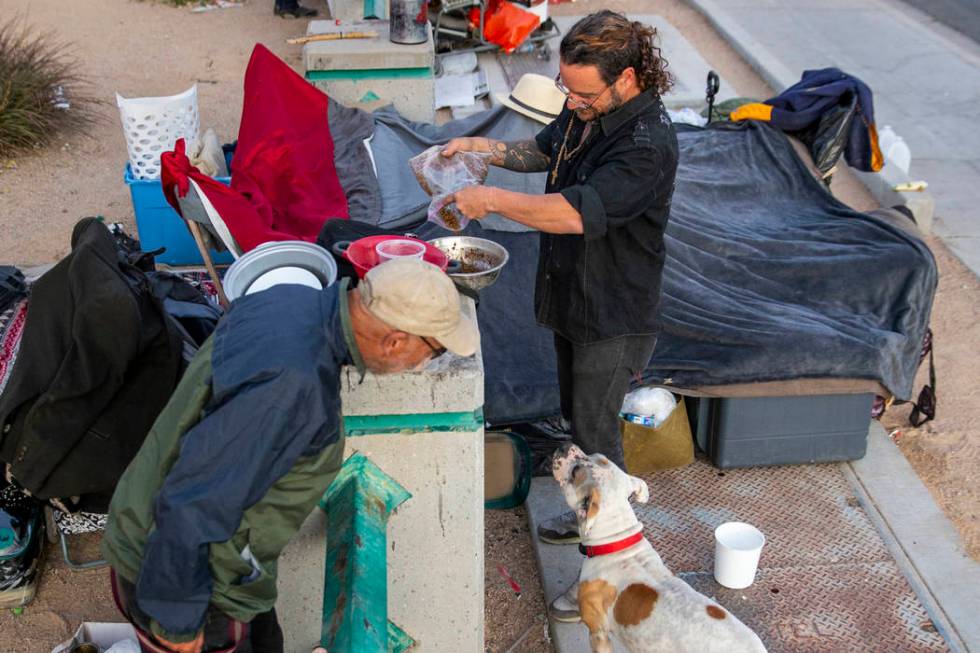Las Vegas homeless camping ban: What you need to know

The Las Vegas City Council on Wednesday adopted a controversial proposal that bans people from camping and sleeping in public areas in downtown Las Vegas, and in residential areas throughout the city, if there are beds free at established homeless shelters.
Under the ordinance, violators could be charged with a misdemeanor crime.
Here are some frequently asked questions about the bill:
When does it go into effect?
The bill goes into effect on Nov. 10, and the criminal component will be enforced starting Feb. 1.
What does it do?
It makes it a misdemeanor, punishable by up to six months in jail and/or a $1,000 fine, to camp or sleep in the public right of way in certain areas of the city.
What is a public right of way?
Any street, alley, highway or public sidewalk.
In which areas of the city does this apply?
The ordinance applies to downtown Las Vegas and to any public right of way in the city that is adjacent to property zoned for residential use.
Anywhere else?
Yes, the ordinance also applies to any public right of way within 500 feet of any receiving dock of a food processing facility. Put simply, that means any business that manufactures, processes or packages food products.
As the Council and the @mayoroflasvegas sat back down, the protestors began to chant. pic.twitter.com/31g1bjWc55
— Briana Erickson (@ByBrianaE) November 6, 2019
What does ‘camping’ mean?
By ordinance definition, to “camp” or “lodge” means to sleep or be in a temporary outdoor shelter, cooking over an open flame or fire outdoors, laying down bedding or setting up a tent or similar shelter for the purpose of sleeping or temporary living.
Is there anything else that will be illegal?
Technically, sitting or lying down in a public right of way also falls under the conditions of the ordinance.
Are there exceptions?
The ordinance contains several exceptions for sitting or lying down that include as a result of a medical emergency or disability; waiting for public or private transportation or access into a building; participating in or attending a parade, festival, rally or similar lawfully conducted event; sitting on a chair or bench supplied by an abutting private property owner; and operating or patronizing a business or governmental service.
What is this ordinance trying to do?
At its core, this is all about the homeless. City officials want to stem the growing tide of homeless individuals sleeping and camping in public and compel them to seek shelter and assistance.
Why the caveat about shelter capacity?
The ordinance will only be enforced when there are beds available at established homeless shelters. The idea is that if the city-operated Courtyard Homeless Resource Center, the Las Vegas Rescue Mission or any publicly funded emergency shelter within the city’s jurisdiction has beds, then homeless individuals have a choice to seek shelter and services instead of staying on the sidewalk or elsewhere in public.
Any other reason for the caveat?
Yes, legal considerations. The 9th U.S. Circuit Court of Appeals overturned a similar camping ban last year in Boise, Idaho, because the city did not make enough shelter beds available, which the court found to violate the constitutional ban on cruel and unusual punishment.
Who will check to determine if the ban is ‘on’?
According to Las Vegas’ ordinance, the director of the city’s Office of Community Services, or someone designated by that office, will immediately notify the city’s Department of Public Safety and the Las Vegas Metropolitan Police Department when the shelters have reached maximum occupancy.
Who supported the ordinance?
Mayor Carolyn Goodman, Councilwomen Michele Fiore and Victoria Seaman and Councilmen Cedric Crear and Stavros Anthony voted for the ordinance.
Supporters say it isn’t about putting anyone in jail but instead driving them to seek help and, in turn, protecting them and the interests of businesses nearby where the homeless sleep.
The Downtown Vegas Alliance, which represents more than 70 downtown business, nonprofit and civic leaders, called the proposal “an important and necessary first step to help protect those who have made significant investment in the area.” In a recent survey, 83 percent of DVA members supported the bill, but only 46 percent believed the city had the resources necessary to enforce it.
Who is opposed?
Councilwoman Olivia Diaz and Councilman Brian Knudsen voted against the ban.
And as of Nov. 6, eight Democratic presidential candidates have announced their opposition to the bill. They are: former Housing and Urban Development Secretary Julian Castro, Massachusetts Sen. Elizabeth Warren, hedge fund billionaire Tom Steyer, New Jersey Sen. Cory Booker, Vermont Sen. Bernie Sanders, former Vice President Joe Biden, California Sen. Kamala Harris and South Bend Mayor Pete Buttigieg. Locally, activist groups like the American Civil Liberties Union and Battle Born Progress have said the bill criminalizes homelessness and called upon officials to focus on affordable housing policies. Others, like Catholic Charities of Southern Nevada, pushed for investments in mental health and addiction treatment.
Another argument from detractors is that, because shelter beds are rarely if ever free, the ordinance itself is moot.
Haven’t we seen this before in Las Vegas?
In September 2018, the Las Vegas City Council killed a nearly identical measure that would have banned sitting and camping within 1,000 feet of food processing facility loading docks. But that bill did not contain the language that stipulated it would be enforced only if beds were free.
Contact Shea Johnson at sjohnson@reviewjournal.com or 702-383-0272. Follow @Shea_LVRJ on Twitter.